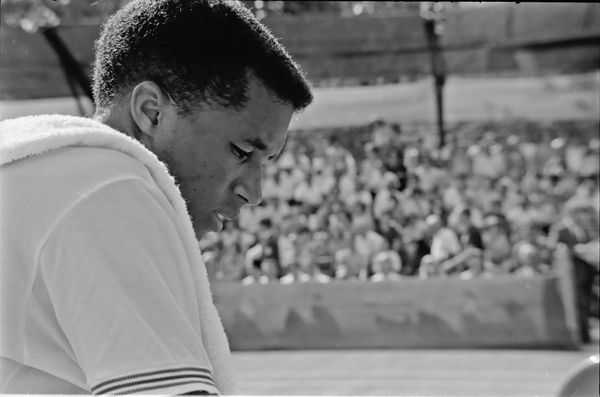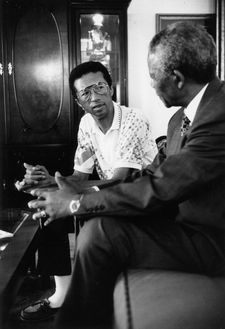Citizen Ashe (a highlight of the 12th edition of DOC NYC as a Centerpiece selection and the Human Rights Award recipient at the upcoming 14th Hamptons Doc Fest) features poignant on-camera interviews with Arthur Ashe’s brother Johnnie Ashe, his widow Jeanne Moutoussamy-Ashe, Donald Dell, Olympian John Carlos, Olympic Project for Human Rights founder Harry Edwards, Billie Jean King, John McEnroe, Art Carrington (author of Black Tennis: An Archival Collection Between 1890 and 1962), Lenny Simpson (founder of One Love Tennis), Charlie Pasarell (National Junior Tennis League) and former United States Ambassador to the United Nations, Congressman Andrew Young, Jr.
 |
| Rex Miller with Anne-Katrin Titze quoting Arthur Ashe: “A true champion is one that leaves his sport and the world a better place.” |
In my conversation with Rex Miller (who is also the director of Althea on Althea Gibson, the first Black woman to win Wimbledon) on his and Sam Pollard’s very socially relevant documentary, we talk about Arthur Ashe’s personal connections to Martin Luther King, Jr., Bobby Kennedy, and Nelson Mandela, crossover tennis stars such as Serena Williams, Naomi Osaka, and Rafael Nadal, reaching out to Jimmy Connors more than once, being filmmaker Steven Cantor's tennis coach, the role Ashe’s brother Johnnie plays during the Vietnam War, and the possibility initially of making the film exclusively on the year 1968.
From the experience of segregation during his childhood in Richmond, Virginia, where Ashe learned to play tennis at a playground where his father was the caretaker to the offer of a scholarship from UCLA, and being at West Point, while his brother served two tours in Vietnam to protect him from being drafted - Miller and Pollard explore the formative experience of the man who changed the sport of tennis and left an equally important mark as activist and citizen.
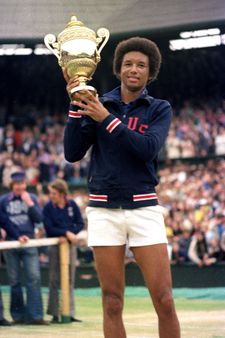 |
| Arthur Ashe in 1975 becomes the first Black man to win Wimbledon |
1975, Arthur Ashe was named Player of the Year after he defeated Jimmy Connors at Wimbledon (the first Black man to do so). In a clip, when asked about whom he admires, President Obama mentions Mohammad Ali and Arthur Ashe, who started out at opposite ends of the spectrum, before both becoming role models of how athletic fame can be used for much larger causes that better the world. Ashe who revered Nelson Mandela, played in South Africa, despite calls for a boycott, and insisted on desegregation of the stadium. The interviews give insight into the evolution of Arthur Ashe’s activism.
From Durham, North Carolina, Rex Miller joined me on Zoom for an in-depth conversation on Citizen Ashe.
Anne-Katrin Titze: Hello Rex! How are you and where are you?
Rex Miller: Hello Anne-Katrin! I am at home in Durham, North Carolina. Where are you?
AKT: I’m in New York.
RM: I grew up in New York and I escaped, as I say.
AKT: How does Arthur Ashe say in your film, “to make your mark you have to leave?”
RM: Yes, exactly. Ha! Well said.
AKT: I first became interested in your film because I noticed one of your producers, whom I had a conversation with earlier this year, Steven Cantor. I spoke previously with him about his dance films, the one on Sergei Polunin, and more recently Twyla Moves. How did you connect with Steven Cantor?
RM: He didn’t tell you this?
AKT: No, we talked about other things, not your film.
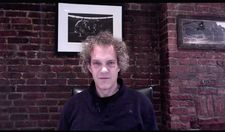 |
| Rex Miller on Citizen Ashe producer, Twyla Moves and The Dancer director Steven Cantor at 16 or 17: “I was his tennis coach in New York.” Photo: Anne-Katrin Titze |
RM: When Steven Cantor was about 16, 17 and I was about 22, 23, I was his tennis coach in New York.
AKT: Oh great! That’s a wonderful link!
RM: I like to say, I helped shape him to what he became. Not really, but I did spend a year when I used to coach him and play tennis with him. He actually went to the same college that I did and played tennis there as I did.
AKT: Which college is that?
RM: Colgate University. And then I reconnected with Steven I think about 15 years after college and he was already on his way as a filmmaker and I had shot some for Steven on his film projects. Then when I started this project it was kind of a natural to join forces with his production company that brought a lot of funding and structure to the production.
AKT: How perfect the tennis connection! To have a film title that starts with Citizen is always a good idea, you’re in good company. Also, this is as much a film about a tennis champion as it is about his activism and his cultural importance, yes?
RM: Right, for me from the very first informal proposal, the first sentence was: This is not a tennis film. Because I know from past experience that can be kind of limiting because the business folks would say it’s only for tennis players. I think now more than ever you can make a film that is only a tennis film, when we have all these tennis champions that are like crossover celebrities, Serena [Williams], Naomi [Osaka], Raffa [Rafael Nadal]. And we know them beyond tennis.
Even though I’m a tennis guy and I played junior tennis and college tennis and senior tennis and I still coach tennis and my teenage daughter plays tennis, for me it was more what he was doing off the court. As Arthur said “A true champion is one that leaves his sport and the world a better place.”
AKT: It’s more important than ever, especially if you have a platform like that, it is vital to use it. His childhood you look at in detail - his mother died when he was six, his father was illiterate and he was reading the newspaper to him. Were you surprised when you found out all these things about his childhood?
RM: I love the research part of things. I knew a lot about Arthur’s tennis career and I knew somewhat about his activism because I learned about apartheid in South Africa through Arthur Ashe going there. Arthur went to South Africa in the Seventies when I was like a 12-, 13-year old and I didn’t know anything about apartheid. Through Arthur and following his tennis career I learned about it.
One of the moments in his childhood that stood out to me is the murder of Emmett Till. That happened when Arthur was the same age as Emmett Till, when they were about 13, 14 years old. As Arthur says, if you were Black in America, even if you were illiterate, you knew who Emmett Till was. So to me that really became part of his DNA. And he had a strict disciplinarian father, but as Arthur’s brother Johnnie points out, that discipline was designed to keep them safe.
And in the South, growing up in Richmond, in the capitol of the Confederacy - and we’re talking about the 1940s at this point when Arthur was born in ’43 - the message was, keep your head down, don’t make waves. When Arthur was taking first steps at activism or being a tennis player with a little bit of fame, being just even at UCLA or playing the Davis Cup, he was also the only person of colour in the game of tennis.
So he knew if he were to pull a John Carlos, Tommie Smith [Rex raises his right fist] as they did at the 1968 Olympics, that wasn’t going to open doors for him in the lily-white world of pro tennis, or top-tier tennis. He was very pragmatic, one step at a time. And I think that comes right from his upbringing in the South and his disciplinarian father.
AKT: You bring up his brother, who did two tours in Vietnam to protect Arthur, so that he wouldn’t have to go. That stems from World War II when entire families, the sons were wiped out. The brother is fascinating, the way he talks to you.
RM: Yeah, Johnnie Ashe is not only a great character in this film, but he’s just a great man, like one of my favourite people. He’s so smart, so calm, and so self-effacing. As baby brother - I think they were four years apart - he looked up to Arthur. But he saw in Arthur at that moment in 1968 when Arthur was going to maybe have to go to Vietnam, he saw that Arthur was on the verge of really changing the world. That he was maybe going to reach those goals of being a champion and also being an activist.
And he also knew from knowing Arthur, as he says in the film, Arthur’s nature was not going to do well in Vietnam. Johnnie describes himself as being more like his father. I know how to get through Vietnam but Arthur is too sensitive, too spiritual. So he made the ultimate sacrifice and signed up again for another tour so that Arthur wouldn’t have to go.
 |
| Citizen Ashe opens its Oscar-qualifying theatrical engagement at the Quad Cinema in New York Photo: Anne-Katrin Titze |
AKT: Just the year 1968. What a pivotal year for him, as well as for the world. The assassinations of Martin Luther King, Jr., Bobby Kennedy. What went on in South Africa. For Arthur Ashe, he is winning, but also the threat of Vietnam. Were you structuring your film around the core of 1968?
RM: Absolutely, Anne-Katrin. At one point we were maybe going to make a film that was entirely in 1968. The whole year was fascinating because of what was going on in the world. We had timelines of April this happened, May assassination, June assassination, Vietnam protests, Czechoslovakia, riots in France. Arthur started the year in January being stationed as a lieutenant at the US Military Academy at West Point, and finished the year there too.
Cinematically one of the challenges was, okay, how much do we show about the forces exploding in the outside world and how much do we stay through Arthur’s narrative and how much do we bounce back and forth. So it became a little dance of, speaking just about 1968, to narrow those connections to those that were directly connected to Arthur. For instance Martin Luther King did not just happen way over there, Arthur had already received a letter from Martin Luther King welcoming him to the movement.
Bobby Kennedy wasn’t like way over cross town, Arthur was with him, campaigning for Bobby Kennedy. Donald Dell, who was Arthur’s agent, later his Davis Cup captain and his friend, helped run Bobby Kennedy’s campaign. It’s an incredibly close connection. Dell was one of the pallbearers for Bobby Kennedy. These were very close connections and it’s kind of a dance to figure out what to put in and what to leave out.
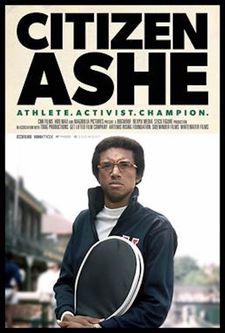 |
| Citizen Ashe poster |
AKT: I can imagine. The whole trajectory - he changed so much, he evolved. There are a few films in DOC NYC where you see the characters actually changing, from Jacques Cousteau’s marine preservation to Julia Child, who late in life became active in Planned Parenthood. Arthur Ashe is a great example, of course. One more question about your interviews. Did you reach out to Jimmy Connors?
RM: I reached out through the tennis world and I found Karen Happer, who has a 50-year career in tennis as an agent, as a marketing person and she kind of represents Jimmy and his limited dealings with the media. She is a big fan of Arthur Ashe and loved Arthur and loved the project that we were doing and she really wanted Jimmy to do it. She set the table as best she could, saying wonderful things about me and my team.
And I wrote Jimmy a long impassioned letter, you know, where I showed empathy for him. The big first response was: He didn’t say no. Then Sam [Pollard] reached out about a year later and again, he didn’t say no. And then finally he said no. We’ll send Jimmy the film, we’ll hope he sees it. I actually think he’ll wish that he had done it. Who knows, can’t really speak for Jimmy.
Citizen Ashe screens on Saturday, December 4 at 5:00pm followed by a Q&A on Zoom with Sam Pollard and Rex Miller in conversation with Nancy Buirski at the Sag Harbor Cinema.
Hamptons Doc Fest in cinemas (Sag Harbor Cinema, Bay Street Theater) runs from Friday, December 3 through Friday December 10. Select films are screening online in the US from December 11 through December 18.
DOC NYC in-cinema Centerpiece screening of Citizen Ashe took place on Saturday, November 13.
DOC NYC 2021 in cinemas (IFC Center - SVA Theatre - Cinépolis Chelsea) ran from November 10 through November 18. Select films screened online in the US from November 19 through November 28.
Citizen Ashe will open on Friday, December 3 at the Quad Cinema in New York and on December 10 in Los Angeles, followed by CNN’s broadcast premiere and HBO Max’s streaming premiere.








